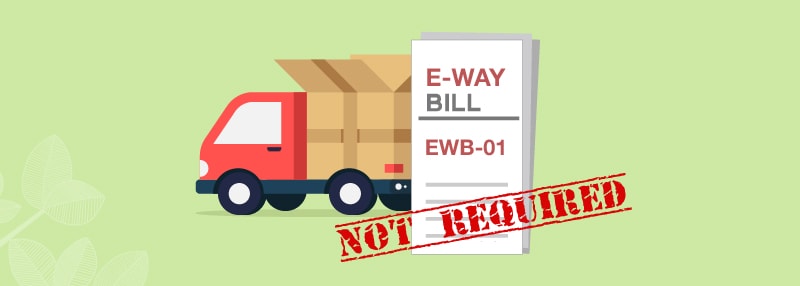Ever since December 2017, when the e-way bill came back into the scheme of things under GST, businesses and transporters have been proactively equipping themselves for a smooth e-way bill implementation. Trial runs of the same started in January and a full-fledged roll-out was attempted in February, which unfortunately was deferred due to technical glitches in the portal. However, at the 26th GST Council meet, a new date for e-way implementation has been set as the 1st of April, 2018 with 1st June, 2018 being the target date for a nation-wide roll-out completion. While businesses need to be aware about the e-way bill rules in great detail, they also need to be aware about when is e-way bill not required, which is bound to save time and effort. In this blog, we will understand all those cases, where the movement of goods does not warrant the generation of an e-way bill irrespective of the value of movement of goods, as well as the e-way bill exemption list for all goods for which e-way bill is not mandatory.
When is e-way bill not required
If you want to know when is EWB not required, here are the following scenarios:
- Where goods are being transported by a non-motorised conveyance
- Where goods are being transported from the customs port, airport, air cargo complex and land customs station to an Inland Container Depot (ICD) or a Container Freight Station (CFS) for clearance by customs
- Where goods are being transported under customs bond from an Inland Container Depot (ICD) or a Container Freight Station (CFS) to a customs port, airport, air cargo complex and land customs station
- Where goods are being transported under customs supervision or under customs seal
- Where goods are being transported from one customs station or port to another customs station or port
- Where goods are being transported as transit cargo from or to Nepal or Bhutan
- Where goods are being transported up to a distance of 20 KMs from the place of the business of the consignor to a weigh-bridge for weighing or from the weigh-bridge back to the place of the business of the said consignor. However, in this case, the movement of goods has to be accompanied by a delivery challan
- Where goods are being transported by rail and the consignor of goods is the Central Government, State Governments or a local authority
- Where empty cargo containers are being transported
- Where movement of goods is being caused by defence formation under the Ministry of Defence as a consignor or a consignee
- E-way bill not required, where the following goods are transported, which are goods exempted from e-way bill:
- Alcoholic liquor for human consumption
- Petroleum crude
- High speed diesel
- Motor spirit (commonly known as petrol)
- Natural gas
- Aviation turbine fuel
- Liquefied petroleum gas for supply to household and non-domestic exempted category (NDEC) customers
- Kerosene oil sold under public distribution system (PDS)
- Postal baggage transported by Department of Posts
- Natural or cultured pearls and precious or semi-precious stones
- Precious metals and metals clad with precious metal
- Jewellery, goldsmiths’ and silversmiths’ wares and other articles
- Currency
- Used personal and household effects
- Coral, unworked and worked coral
- Goods, apart from de-oiled cake, which are exempt from tax under notification no. 7/2017 and notification no. 26/2017 under Central Tax, which are subject to amendment from time to time
- E-way bill not required for goods which are treated as no supply under Schedule III of the CGST Act
- Goods exempted from e-way bill under Rule 138 (14) in the respective State / Union Territory GST rules – i.e. list of 153 items exempt from e-way bill, including most items for household and daily use
Businesses and transporters will thus need to keep this e-way bill exemption list in mind, so that they are aware about when to generate, and when not to generate the e-way bill for movement of goods.
